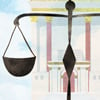Question:
My son came home from school with papers from a unit on the origins of democracy and human rights. Everything is traced to thinkers such as John Locke, and then a big jump back to the Stoics and Athens. Where do we Jews fit into this picture?
Response:
The Torah is the birthplace of modern ideas of equality. In fact, in its time, the Torah was a revolutionary book of political thought.
Throughout the ancient world, the truth was self-evident: all men are not created equal. You were what you were born: a king, a noble, or a serf. An orderly society was one in which people knew their place. As Aristotle put it in (supposedly) democratic Athens, justice meant that "equals should be treated as equals and unequals as unequals."
It's fascinating to see how the stories of the Torah, and even more so its laws, systematically reworked these of ancient norms and institutions, creating a society that discouraged hierarchy and stratification and empowered and ennobled the citizenry.
Take the Torah's economic laws, for example. Elsewhere, land was owned by the king and by the temples, while the common folk worked as serfs or as slaves. But in the Torah, God – who officially owns the land – gives it over to the Israelites. Every common Israelite is a land owner (Leviticus 25), which means that every Israelite has a source of income – history's first example of universal private ownership of land by the citizens.
Or take the issue of debt relief. In other cultures, a king would cancel debts in his first year of reign, precisely when he needed a boost of political capital, at once endearing him to the masses, and at the same time weakening the rich lenders, the group most in position to challenge him. Debt cancellation of this sort is actually the original Greek meaning of our modern day English words amnesty and philanthropy. The Greek historian Plutarch writes that when the Spartan ruler Agis sought to impose debt relief, the measure was considered by his detractors as nothing more than a Robin-Hood scheme: "By offering to the poor the property of the rich, and by distribution of land and remission of debts, he [bought] a large bodyguard for himself, not many citizens for Sparta."
Agis was simply following the standard practice of rulers in antiquity. Against that backdrop, consider the debt-relief program prescribed by Torah: in the Torah, debt-cancellation is enacted automatically every seven years. No longer the political tool of a new monarch, debt relief in the Bible becomes the legislated right of the common citizen (Deuteronomy 15).
The Torah revolutionized taxation as well. Elsewhere, taxes, or tithes, were levied to support the palace and the temples. But the Torah introduces a new type of tax; a tax that productive farmers pay to support the less-well-off: history's first redistributive tax for a social purpose (Deuteronomy 14).
But perhaps nothing was as radical as the Bible's notion of political office. A bit of constitutional history: think of the British parliamentary system. There's a House of Lords and a House of Commons. The thinking was to divide legislative power so that the two houses could balance each other. But what is shocking to American sensitivities is that the British understood that the best way to achieve this balance was by taking advantage of existing class distinctions, and actually enshrining them, by dividing political power along those very same lines.
The history of mixed governments, where several bodies share power is very old. But throughout history the concept was always the same: identify the competing classes within society and assign each a little bit of the power. Only with the American Founding Fathers do we eventually find a new notion of political office, in which a political office exists without reference to class, and which any citizen is eligible to hold.
This revolutionary notion of political office has only one precursor: the Torah. Any citizen can be chosen to be a judge (Deuteronomy 16). In fact, the Torah doesn't speak about the process of choosing judges, other than that the people (the collective "you") must choose them from among themselves. That is even more significant when one considers that the monarch was beneath the law. The "elders" and "judges" we meet throughout the Bible—and later in the Mishnah—formed a veritable parliament for the people, of the people. In practice, many came from common homes and supported themselves with menial labor and crafts.
As for the monarch, the Torah specifies that the people will have a king over them, only if they initiate the idea (Deuteronomy 17:14; cf. 1 Samuel 8). Until David was chosen as king, any citizen could have been chosen (Deuteronomy 17). Even afterwards, the hereditary rights were predicated upon the king finding favor in the eyes of God and the eyes of the people. This is the halachah today as well: the future Davidic king will be deemed legitimate only if he is able to rally the people around him (Maimonides, Laws of Kings 11:4-5).
Moreover, the Bible does not specify a body to choose the king. Again, as with the judges, it simply assigns this task to the collective "you" of the whole of Israel; the citizenry as a whole is to be represented in the choice of its leaders.God must also give his approval of the candidate, via the prophet. Conceptually, however, the choice belonged to the people (as we see in the story of Samuel anointing Saul).
The egalitarian revolution is also seen with regard to the Bible's view of technologies of communication. We understand how critical computer literacy is to leveling the playing field of knowledge and power and are thankful that we live in a culture that seeks to encourage it. And we understand why the world's darkest dictatorships do little to encourage such literacy: To educate the masses in computer literacy is to empower them.
The Torah entered the world a few years before the internet, but it took advantage in an extraordinary way of an equally potent technology of communication: the alphabet. Elsewhere, writing systems, such as hieroglyphics in Egypt, were extremely cumbersome, and took years to master. But the scribes that did, were guaranteed a good life, because of the special skills they possessed. In fact, an ancient Egyptian poem describes a father's urgings to his son that he attend scribal school, and how it will guarantee him a place in the upper class. "You'll love scribal school more than your own mother," the father promises.
The Torah, however, was written using the alphabet – which anyone can learn -, and is the first text in the ancient world to suggest that it be copied and disseminated to the masses (Exodus 24 and Deuteronomy 31). The Torah was unafraid of the Israelites achieving literacy, because it sought to create an ennobled and empowered citizenry. For more on the revolution of the alphabet, see The Twitter Revolution.
There can be no question that the obligation to instruct children in the commandments and teachings of the Torah (Deuteronomy 6:7) was greatly facilitated by the fact that the Torah was written in an easily learned script. The Bible was the first document ever written for public consumption in an alphabetic script.
Perhaps nowhere did the Torah revolutionize the standing of the common person, as it did with regard to the standing of women. In the narrative literature of the ancient Near East, we find that women fill only two roles: they either satisfy mens' desires, or they tempt them. It is in the Torah that we first encounter women like Sarah, Rebecca, Miriam and Yocheved who are noted for their industriousness, insight, courage, and spiritual acuity. For the first time in the history of western literature women are people too.
But what about slavery? It is true that the Torah does use the term eved ivri, but this is mistakenly translated as "Hebrew slave." The word eved in the Bible can be used to describe the service of a highly placed minister to his king, or even of Moses' service to the Almighty. The relationship laid out by the Torah called eved ivri, is a method of helping the indebted work their way out of insolvency under favorable terms, that allow them to get back on their feet again – without a permanent blemish to their credit rating. Concerning the non-Jewish slave, see Torah, Slavery and the Jews.
It is true that only the sons of Aaron could become kohanim. Yet, here, too, we can see how the Torah revolutionized what it meant to be a "priest." Priesthood in the ancient Near East brought with it privileges that rendered priests an empowered elite. In Torah, however, priests are neither an economic nor political class. They had no special rights before the law or political power.
The Torah worked to make sure that priests served the people, and not the other way around. Elsewhere, priests were real-estate magnates who controlled all the state property (see Genesis 48). In the Torah, the kohanim are expressly forbidden to hold income producing lands. Elsewhere, the laws of the cult were strictly guarded, and commoners were forbidden from entering the central shrine. The Torah publicizes all the laws of the Temple, and common people play a vital and constant role in the Temple rituals. Elsewhere, priests are depicted as beyond reproach. The Torah underscores the humanity and fallibility of the priests. Virtually the only stories we posses about the kohanim are the account of how Aaron built the golden calf (Exodus 32) and how his sons, Nadab and Abihu, overstepped their bounds in the Tabernacle (Leviticus 10) – not exactly stories meant to glorify.
It should come as no surprise then, that the Bible in its entirety knows no word for "noble", and no word for "class", and stands without precedent as the birthplace of egalitarian thought.







Join the Discussion